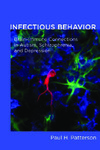Please use this identifier to cite or link to this item:
http://lib.hpu.edu.vn/handle/123456789/33489Full metadata record
| DC Field | Value | Language |
|---|---|---|
| dc.contributor.author | Patterson, Paul H. | en_US |
| dc.date.accessioned | 2020-08-04T02:52:19Z | - |
| dc.date.available | 2020-08-04T02:52:19Z | - |
| dc.date.issued | 2011 | en_US |
| dc.identifier.isbn | 9780262016452 | en_US |
| dc.identifier.other | HPU2164324 | en_US |
| dc.identifier.uri | https://lib.hpu.edu.vn/handle/123456789/33489 | - |
| dc.description.abstract | In Infectious Behavior, neurobiologist Paul Patterson examines the involvement of the immune system in autism, schizophrenia, and major depressive disorder. Although genetic approaches to these diseases have garnered the lion's share of publicity and funding, scientists are uncovering evidence of the important avenues of communication between the brain and the immune system and their involvement in mental illness. Patterson focuses on this brain-immune crosstalk, exploring the possibility that it may help us understand the causes of these common but still mysterious diseases. The heart of this engaging book, accessible to nonscientists, concerns the involvement of the immune systems of the pregnant woman and her fetus, and a consideration of maternal infection as a risk factor for schizophrenia and autism. Patterson reports on research that may shed light on today's autism epidemic. He also outlines the risks and benefits of both maternal and postnatal vaccinations. In the course of his discussion, Patterson offers a short history of immune manipulation in treating mental illness (recounting some frightening but fascinating early experiments) and explains how the immune system influences behavior and how the brain regulates the immune system, looking in particular at stress and depression. He examines the prenatal origins of adult disease and evidence for immune involvement in autism, schizophrenia, and depression. Finally, he describes the promise shown by recent animal experiments that have led to early clinical trials of postnatal and adult treatments for patients with autism and related disorders. | en_US |
| dc.format.extent | 179p. | en_US |
| dc.format.mimetype | application/pdf | |
| dc.language.iso | en | en_US |
| dc.publisher | MIT Press | en_US |
| dc.subject | Immune systems | en_US |
| dc.subject | Mental illness | en_US |
| dc.subject | Autism illness | en_US |
| dc.title | Infectious Behavior: Brain-Immune Connections in Autism, Schizophrenia, and Depression | en_US |
| dc.type | Book | en_US |
| dc.size | 1,34 MB | en_US |
| dc.department | Sociology | en_US |
| Appears in Collections: | Sociology | |
Files in This Item:
| File | Description | Size | Format | |
|---|---|---|---|---|
| Infectious-Behavior.pdf Restricted Access | 1.38 MB | Adobe PDF |  View/Open Request a copy |
Items in DSpace are protected by copyright, with all rights reserved, unless otherwise indicated.
